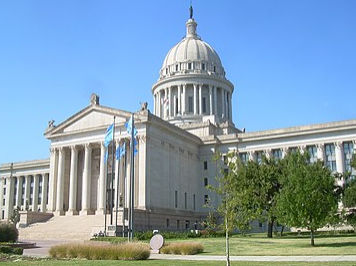
- Details
- By Chuck Hoskin Jr
Guest Opinion. Cherokee Nation citizens can be found all over the world, but the largest Cherokee communities are right here on our 14-county reservation in northeastern Oklahoma. Our tribal government and businesses are headquartered in Oklahoma, and we will never leave. We know that over the long term a prosperous Cherokee Nation and a prosperous Oklahoma go hand in hand.
That is why we pay close attention to what happens at the Oklahoma State Legislature. Nineteen members of the Legislature are citizens of Native American tribes, including nine Cherokees, and many others are strong partners as our friends and neighbors. Cherokee Nation is grateful to have many friends in the Legislature coming from both parties, from both legislative chambers, and from every area of the state. Even when we don’t agree on an issue, we are always ready to work together with legislators to find win-win solutions.
Want more Native News? Get the free daily newsletter today.
The current legislative session, which began earlier this month, will be no different. Cherokee Nation has been reviewing all of the bills filed for this session and preparing to advance good ideas for our tribe and for Oklahoma.
One bill that we take a special interest in this year is HB 4107 by Rep. Mark Vancuren. This bill would allow tribal education departments to certify teachers at tribally operated public schools with a state charter.

Once passed into law, HB 4107 would direct the Oklahoma State Department of Education to recognize teacher certifications by a tribal education department, much like they already do for certifications from other states and countries. This certification would apply only to the tribe’s Cherokee Language Immersion School in Tahlequah and soon expanding to Adair County, which we operate under a charter arrangement with the state to obtain supplemental funding.
This legislation is especially urgent for Cherokee Nation as we increase efforts to revitalize the Cherokee language among the youngest Cherokees. With only about 2,000 Cherokee first-language speakers remaining, bringing enough fluent certified teachers into the classroom is a special challenge. HB 4107 gives us the flexibility to ensure our immersion students can have a great education covering all subjects, entirely in the Cherokee language.
Another bill we are continuing to advocate for this year is HB 2089 by House Speaker Charles McCall. This bill creates a tax credit for physicians practicing in rural areas or at tribal facilities.
Cherokee Nation is deeply committed to addressing the rural doctor shortage, which is one of the reasons why we started the first tribally affiliated medical school in the nation. The first class of the OSU College of Osteopathic Medicine at Cherokee Nation is now in its third year. These students will soon be finding places in residency programs and beginning their professional practice as physicians. The time is right to solidify this pipeline of doctors into rural Oklahoma.
HB 2089 already passed the House unanimously last year and is available to be heard by the full Senate at any time. It’s a great example of how Cherokee Nation and the state can combine our efforts to work on a problem that affects us both.
We will continue to watch other legislative proposals throughout the session that may impact Cherokee Nation, whether in the areas of public safety, gaming, education, economic development, health or more. While some in state government have sought to divide us out of a misguided belief that Oklahoma has something to gain by diminishing the sovereignty of tribal nations, the large majority of state leaders recognize the foolishness of that approach. We will continue to work with those constructive Oklahoma partners this year and for many years to come.
Chuck Hoskin, Jr. is the principal chief of the Cherokee Nation.
More Stories Like This
Law Should Not Get in the Way When "Manifest-ing Destiny"Celebrating 35 Years of Gaming Success
My Tribe’s ICE Contract Betrayed Our Values
Extending the Affordable Care Act Is a Moral Imperative for Indian Country
All Is Fair in … War?
Help us defend tribal sovereignty.
At Native News Online, our mission is rooted in telling the stories that strengthen sovereignty and uplift Indigenous voices — not just at year’s end, but every single day.
Because of your generosity last year, we were able to keep our reporters on the ground in tribal communities, at national gatherings and in the halls of Congress — covering the issues that matter most to Indian Country: sovereignty, culture, education, health and economic opportunity.
That support sustained us through a tough year in 2025. Now, as we look to the year ahead, we need your help right now to ensure warrior journalism remains strong — reporting that defends tribal sovereignty, amplifies Native truth, and holds power accountable.
 The stakes couldn't be higher. Your support keeps Native voices heard, Native stories told and Native sovereignty defended.
The stakes couldn't be higher. Your support keeps Native voices heard, Native stories told and Native sovereignty defended.
Stand with Warrior Journalism today.
Levi Rickert (Potawatomi), Editor & Publisher
